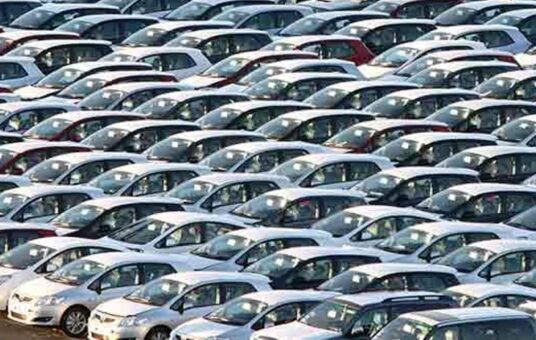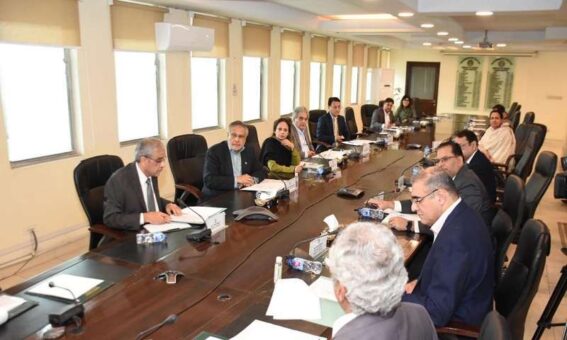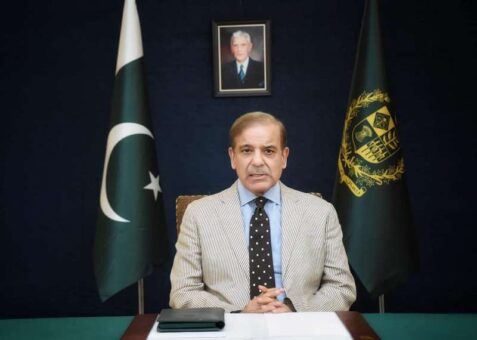ISLAMABAD: Federal Board of Revenue (FBR) has been directed to examine chargeability of sales tax on computerized arms license in the form of cards.
(more…)Tag: sales tax
-

Massive increase in prices of 1400CC+ cars likely after luxury sales tax
Experts estimated a massive hike in prices of cars with capacity of 1400CC and above after imposition of sales tax rate at 25 per cent.
(more…) -

Complete PCT details of imported CBU motor vehicles for 25% sales tax
KARACHI: Federal Board of Revenue (FBR) issued Pakistan Customs Tariff (PCT) details of Completely Built Up (CBU) imported motor vehicles on which sales tax at 25 per cent is applicable.
(more…) -

FBR issues list of luxury imported, local goods for imposing 25% sales tax
The Federal Board of Revenue (FBR) in Pakistan issued a comprehensive list on Wednesday, March 8, 2023, outlining the imposition of a 25% sales tax on both imported and locally produced luxury goods.
(more…) -

Pakistan slaps 25% sales tax on import of mobile phones valuing above $500
In an effort to generate additional revenue and bridge fiscal gaps, Pakistan has imposed a 25% sales tax on the import of mobile phones valued above $500 per piece, according to official sources.
(more…) -

Pakistan petroleum prices to go up with sales tax imposition
The prices of petroleum products in Pakistan will go up with the imposition of sales tax, which presently at zero per cent.
Analysts AKD Research Tuesday stated that with the IMF consistently conveying concerns over possible shortfall on account of petroleum development levy (PDL), the government is looking towards a contingency plan by taking up additional taxation measures, for one, imposing full 17 per cent general sales tax (GST) on petroleum products.
READ MORE: SSGC stops gas supply to industries under load management plan
To note, sales tax collection from the previous fiscal year stood Rs107 billion, against Rs235 billion in the preceding fiscal year, reflecting a decrease of 54 per cent.
With petroleum products sales remaining robust during fiscal year 2021-2022, the halving of the collection was due to sales tax being effectively zero during the second half of the fiscal year, since mid-January more specifically.
READ MORE: Pakistan has sufficient stock of fuel to meet domestic demand
Assuming moderate 8 per cent imposition (Rs16-20 per liter) of sales tax on retail fuel products, the government could fetch additional around Rs30 billion revenue monthly at these rates.
Furthermore, the government is likely to take a major hit in the non-tax revenue department as well i.e. PDL as retail offtakes have continued to decline during first four months of the current fiscal year, down 22 per cent year on year (YoY).
READ MORE: ECC approves raising petroleum levy to Rs50 per liter on RON 95
Total collection during the four months were estimated at Rs115 billion against the budgeted target of Rs250 billion. To note, annual PDL collection target stands at Rs750 billion (Rs62.5 billion per month).
Assuming unchanged trends in POL offtakes and similar rates, total PDL collections will end the current fiscal year at Rs350 billion, an overall shortfall of Rs400 billion.
READ MORE: Petroleum sales decrease by 22% in four months of 2022-2023
The analysts further said that assuming the government pushes through by imposing further levies/taxes, although inflationary, this target may be more achievable now compared to five months ago, as falling global oil/petroleum prices has given the authorities more space to work with without severely hurting end consumers.
-

National Tax Council discusses GST harmonization
ISLAMABAD: National Tax Council on Monday discussed the harmonization of General Sales Tax (GST) in the country.
Federal Minister for Finance and Revenue Senator Mohammad Ishaq Dar chaired a meeting on National Tax Council at Finance Division.
READ MORE: Definitions under Pakistan Income Tax Laws updated up to June 30, 2022
Finance Minister Punjab Mr. Muhammad Mohsin Leghari, Minister of State for Finance and Revenue Dr. Aisha Ghous Pasha, SAPM on Finance Tariq Bajwa, SAPM on Revenue Tariq Mehmood Pasha, Secretary Finance, Chairman Federal Board of Revenue (FBR), Provincial Finance Secretaries and other senior officers of Finance Division attended the meeting.
The meeting reviewed the progress on the decisions of the last meetings of the NTC on harmonization of GST across the country.
The Finance Minister shared that in order to have ease of doing business, harmonization of GST is important. Further, GST harmonization will be a major step towards completion of policy actions under World Bank’s RISE program.
READ MORE: No tax amnesty, no tax rate cut under IMF program: FBR chief
The participants shared their opinions on the harmonization of GST. Chairman FBR and provincial stakeholders extended their consensus to proceed ahead in the spirit of greater national interest for harmonization of GST under the umbrella of National Tax Council (NTC).
In conclusion, Finance Minister Senator Ishaq Dar appreciated the stakeholders for building consensus and settlement of the decision regarding harmonization of GST for ease of doing business.
READ MORE: FBR may withdraw condition of invoice, packing list in containers
-

FBR collects Rs459 billion as sales tax on POL products in TY 2022
The Federal Board of Revenue (FBR) has reported a substantial growth in sales tax collection on the import of Petroleum, Oil, and Lubricants (POL) products during the tax year 2022, reaching an impressive Rs459 billion.
(more…) -

Inquiry ordered into collection of increased sales tax ratio
The government on Sunday ordered an inquiry into the collection of sales tax at increased rates from retailers. Prime Minister Muhammad Shehbaz Sharif directed the investigation, focusing on the imposition of a higher sales tax ratio on small traders through electricity bills, which exceeded the agreed-upon rate.
(more…) -

Pakistan decides to roll back fixed tax scheme
ISLAMABAD: Pakistan has decided to roll back the fixed tax scheme, which was introduced in the Finance Act, 2022 for retailers to pay sales tax through electricity bills.
The government took the decision after severe protest from stakeholders, which also included those service providers who were not under the jurisdiction of federal tax authority.
In order to review the fixed tax regime a meeting was held on August 04, 2022 at the ministry of finance to finalize the collection of sales tax through electricity bills.
READ MORE: FTO investigates tax collection through electricity bills
The meeting was presided over by Finance Minister Dr. Miftah Ismail. The meeting decided that the fixed tax scheme introduced through Finance Act, 2022 would be rolled back ab initio and the retailers would continue to pay taxes as per previous (pre-budget) mechanism and rates.
The meeting decided that for the next three months i.e. July to September 2022, the previous tax rates would continue to apply on retailers.
It was decided that the government would review the situation and would notify new tax rates effective from October 01, 2022.
For reversal of fixed tax scheme, necessary legislation would be enacted by the FBR as soon as possible.
The fixed tax rate was implemented and the FBR started collection through electricity bills effective from July 01, 2022. The power utility on the behalf of the FBR applied the fixed tax on all the commercial connections irrespective of nature of business, including service providers.
READ MORE: Withdrawal of sales tax through electricity bills demanded
The illogical application of fixed tax regime invited huge and cry from the several quarters, which forced the government to review its decision.
Recently, the Federal Tax Ombudsman (FTO) launched investigation in a complaint received regarding sales tax collection through electricity bills.
The FTO on July 29, 2022 issued notices to Secretary, Revenue Division, Chief Commissioner and Commissioner Inland Revenue Large Taxpayers Office (LTO) Karachi, in the complaint filed by Mrs. Fauzia Salman against illegal and unlawful collection of taxes through electricity bills by K-Electric Limited.
The FTO has ordered to conduct an investigation into the complaint. The tax office has been directed to submit reply to the allegation contained in the complaint.
Previously, the complainant sent a letter to K-Electric, the power supply utility in Karachi, and forwarded to the chairman of Federal Board of Revenue (FBR), Federal Ombudsman, and chambers of commerce, Fauzia pointed out that her company had received monthly electricity bill, which included: further tax at 3 per cent; extra tax/retail tax at 5 per cent; and newly introduced sales tax on retailers at Rs6,000 being an inactive taxpayer.
READ MORE: Tax through electricity connections on retailers, service providers
She claimed that the sales tax collection had been made in the bill for the month of July 2022 as her company was a legal service provider.
Furthermore, as per the record of the Federal Board of Revenue (FBR) the law firm is an active taxpayer as per requirement under Income Tax Ordinance, 2001.
In her letter, she explained that Section 3(1A) of the Sales Tax Act, 1990 relates to further tax (leviable where taxable supplies are made to a person who has not obtained registration number), Section 3(5) of the Act relates to Extra Tax (The government may imposed extra tax in addition to tax levied under sub section (1), (2) & (4) of Section 3) and Section 3(9) relates to sales tax on retailers, before and after the amendments made through Finance Act, 2022, under the Sales Tax Act, 1990 are applicable on the persons who is/are dealing in retail business of the taxable goods/supplies and required to be registered under the Act, 1990 but did not registered himself /themselves in FBR for the said purpose.
“Indeed, we [the law firm] are not dealing in supply /retail of taxable goods and as such you have wrongly levied and charged further tax u/s 3(1A), extra tax u/s 3(5) or 3(9) and retail tax u/s 3(9) of the Sales Tax Act, 1990 through the Electric Bills,” according to the letter.
The law firm is only engaged in rendering of legal services on the subject premises, according to the letter.
Under the Sales Tax Act, 1990, neither the company is required to be registered with FBR nor various sales tax through electric bills i.e., Further Tax, Extra Tax and Retail Sales Tax are applicable on it, being a “Service Provider”.
Fauzia said that the K-Electric imposed the sales tax on the monthly bill on the basis of assumption that the commercial connection holder was a retailer.
READ MORE: FBR explains income tax on export of services
“You [the K-Electric] have imposed two taxes under the single provision of law i.e., Section i.e., 3(9) of the Act, 1990 relying on prior and post amendment made in Section 3(9) of the Sales Tax Act 1990 through Finance Act, 2022 which cannot be permitted under the law to charge the taxpayer twice, even if it is applicable,” she pointed out towards important provisions of the law.
The relevant amendment made through Finance Act, 2022 in Section 3(9) of the Act, 1990 is reproduced here as under:-
Section 3(9),–
(i) for the words “five per cent where the monthly bill amount does not exceed rupees twenty thousand and at the rate of seven and half percent where the monthly bill amount exceeds the aforesaid amount”, the words “rupees three thousand per month where the monthly bill amount does not exceed rupees thirty thousand, rupees five thousand per month where the monthly bill amount exceeds rupees thirty thousand but does not exceed rupees fifty thousand and rupees ten thousand per month where the monthly bill amount exceeds rupees fifty thousand” shall be substituted;
(ii) after sub-section (9), the following provisos shall be inserted, namely:–
Provided that the above rates of tax shall be increased by one hundred percent if the name of the person is not appearing in the Active Taxpayers List issued by the Board under section 181A of the Income Tax Ordinance, 2001 on the date of issuance of monthly electricity bill:
Provided further that the Board may through a general order prescribe any persons or class of person who shall pay upto rupees two hundred thousand per month through their monthly electricity bill.
Despite having number of employees who are engaged in monitoring of meter or recording of energy consumption from meter installed on the subject premises, the utility provider has blatantly charged such taxes without verification of status whether the consumers is/are liable to be charged for such taxes or not.
It came to our knowledge from number of electricity consumers that the K Electric Limited has charged such taxes from all Commercial Consumers irrespective of their business status and FBR’s active taxpayer’s profile and treated all of them as “In-active Retailer of taxable goods” which cannot be justified or allowed under the Act, 1990.
Such an act of M/s K Electric Limited comes within the meaning of mal-administration as defined under Section 3 of the Federal Tax Ombudsman Ordinance, 2000.